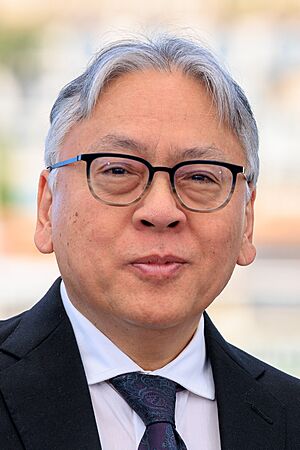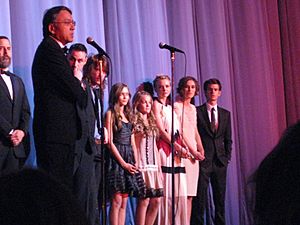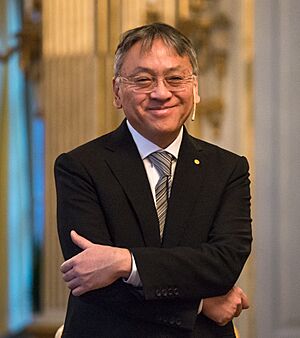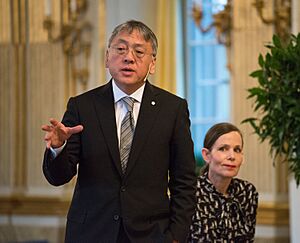Kazuo Ishiguro facts for kids
Quick facts for kids
Kazuo Ishiguro
|
|||||
|---|---|---|---|---|---|
| 石黒 一雄 | |||||

Kazuo Ishiguro in 2025
|
|||||
| Born | 8 November 1954 Nagasaki, Nagasaki Prefecture, Japan
|
||||
| Citizenship |
|
||||
| Education | |||||
| Occupation |
|
||||
| Years active | 1981–present | ||||
| Spouse(s) |
Lorna MacDougall
(m. 1986) |
||||
| Children | Naomi Ishiguro | ||||
| Awards |
|
||||
| Writing career | |||||
| Genre |
|
||||
| Notable works |
|
||||
| Japanese name | |||||
| Kanji | 石黒 一雄 | ||||
| Kana | いしぐろ かずお | ||||
|
|||||
Sir Kazuo Ishiguro (Japanese: 石黒 一雄, Hepburn: Ishiguro Kazuo, /kæˈzuː.oʊ ˌɪʃɪˈɡuroʊ, ˈkæzu.oʊ/; born 8 November 1954) is a famous Japanese-born British writer. He writes novels, short stories, and screenplays. He is known for his powerful stories that explore deep feelings.
Ishiguro has won many important awards for his writing. These include the 2017 Nobel Prize in Literature. The Swedish Academy, which gives out the Nobel Prize, said he "uncovered the abyss beneath our illusory sense of connection with the world." This means his books show us the hidden depths of human feelings.
He was born in Nagasaki, Japan. When he was five, in 1960, his family moved to Britain. His first two novels, A Pale View of Hills and An Artist of the Floating World, explored Japanese culture. Later, he wrote in different styles, including science fiction and historical fiction.
Ishiguro was nominated for the Booker Prize four times. He won in 1989 for his book The Remains of the Day. This book was later made into a movie in 1993. The famous writer Salman Rushdie called it Ishiguro's best work. He said it showed Ishiguro's ability to write about different places and ideas.
Time magazine called his science fiction novel Never Let Me Go the best novel of 2005. It was also listed as one of the top 100 English-language novels published between 1923 and 2005. In 2023, he was nominated for an Academy Award for Best Adapted Screenplay for the movie Living.
Contents
Early Life and School
Growing Up in Two Cultures
Kazuo Ishiguro was born in Nagasaki, Japan, on November 8, 1954. His father, Shizuo Ishiguro, studied the ocean. His mother was Shizuko. In 1960, when Kazuo was five, his family moved to Guildford, England. His father was invited to do research there.
Ishiguro did not visit Japan again until 1989. This was almost 30 years later. He said that the Japanese settings in his first two books were from his imagination. He explained, "I grew up with a very strong image in my head of this other country." He was always building an "imaginary Japan" in his mind while living in England.
Ishiguro is a British Asian author. He said that growing up in a Japanese family in the UK helped his writing. It gave him a different way of looking at things compared to his English friends.
School Days and Music
He went to Stoughton Primary School and then Woking County Grammar School in Surrey. As a boy, he sang solos in church and school choirs. He also loved music as a teenager. He listened to artists like Leonard Cohen, Joni Mitchell, and Bob Dylan.
Ishiguro started learning guitar and writing songs. At first, he wanted to be a professional songwriter. He believes there is a big connection between writing stories and writing songs. He said his style as a novelist comes from what he learned writing songs. He learned to hint at meaning in subtle ways.
After school in 1973, he took a year off. He traveled through the United States and Canada. He wrote in a journal and sent demo tapes of his songs to music companies. He also worked at Balmoral Castle. He later realized that being a musician was not for him.
University Studies
In 1974, he started studying at the University of Kent. He earned a Bachelor of Arts degree in English and philosophy in 1978. After writing fiction for a year, he continued his studies. He went to the University of East Anglia. There, he took a creative writing course. He earned his Master of Arts degree in 1980. His master's thesis became his first novel, A Pale View of Hills, published in 1982.
He became a British citizen in 1983.
Writing Career
Early Novels and Japanese Influence
Ishiguro's first two novels were set in Japan. However, he has said he is not very familiar with Japanese writing. He feels his books are not much like Japanese fiction. His book An Artist of the Floating World (1986) takes place in a Japanese city after World War II. The main character has to deal with his role in the war. Younger people criticize him for Japan's past actions. He then has to rethink his beliefs.
Ishiguro explained that he likes to write about times before and after wars. He is interested in how people's values are tested. He likes to show how people realize their ideals were not what they thought.
In 1989, he released The Remains of the Day. This book is set in a large English country house around World War II. The book was highly praised and won the Booker Prize. It was made into a movie in 1993, starring Anthony Hopkins and Emma Thompson.
Later Works and Awards
His fourth novel, The Unconsoled (1995), is set in a city in Central Europe. It won the Cheltenham Prize for Literature.
Some of Ishiguro's novels are set in the past. Never Let Me Go (2005) has elements of science fiction. It is set in the 1980s and 1990s in a world similar to ours. Time magazine called it the best novel of 2005. It was also on their list of the 100 greatest English language novels. This novel was made into a movie in 2010.
Most of Ishiguro's novels are told from the point of view of one character. The only exception is The Buried Giant (2015).
In 2017, Ishiguro received the Nobel Prize in Literature. He was made a Knight Bachelor in 2018 for his contributions to literature. This means he can use the title "Sir." In 2024, he was also appointed to the Order of the Companions of Honour.
Nobel Prize in Literature
In 2017, Ishiguro won the Nobel Prize in Literature. The award recognized his novels for their "great emotional force." The Swedish Academy said he "uncovered the abyss beneath our illusory sense of connection with the world." Many people were surprised by the choice, but it was generally well-received.
John Mullan, a professor of English, wrote that the Swedish Academy "got it right." He said Ishiguro writes for all times. He uses careful and original methods. Salman Rushdie congratulated his "old friend Ish." He said he loved Ishiguro's work since reading A Pale View of Hills.
Ishiguro said receiving the award was a "magnificent honour." He felt he was following in the footsteps of the greatest authors. He hoped the Nobel Prizes could bring something positive to the world. He wanted to help create a positive atmosphere in uncertain times.
At the award ceremony in Stockholm in December 2017, Sara Danius compared his writing to 19th-century authors. She mentioned Jane Austen and Charles Dickens. She also said Ishiguro is an innovator who takes risks. She noted that he mixes different genres in his books.
Recent Works
Ishiguro's eighth novel, Klara and the Sun, was published in March 2021. It was nominated for the 2021 Booker Prize. The story is told by an "Artificial Friend" named Klara. In this book, Ishiguro explores the dangers of new technology. He also looks at the future of our world and what it means to be human. These are themes he has explored in earlier books too.
Ishiguro also wrote the screenplay for the 2022 British film Living. This movie was based on a 1952 Japanese film called Ikiru. In 2023, Living was nominated for an Academy Award for Best Adapted Screenplay.
Musical Work
Ishiguro has written lyrics for the jazz singer Stacey Kent. He worked with her husband, saxophonist Jim Tomlinson. Ishiguro wrote lyrics for Kent's 2007 album, Breakfast on the Morning Tram. He also contributed to her albums Dreamer in Concert (2011), The Changing Lights (2013), and I Know I Dream (2017).
Ishiguro first met Kent after choosing one of her songs for a radio show. Kent then asked him to write for her. He said that writing song lyrics taught him to hint at meaning. This has greatly influenced his fiction writing.
In March 2024, a book of his lyrics for Stacey Kent was published. It is called The Summer We Crossed Europe in the Rain: Lyrics for Stacey Kent.
Influences
Ishiguro has said that writers like Dostoyevsky and Proust influenced him. His books have been compared to those of Salman Rushdie and Jane Austen. However, Ishiguro himself does not agree with these comparisons. When asked about his favorite novelist, he often mentions Charlotte Brontë. He says he owes his career to her books, Jane Eyre and Villette.
Personal Life
Kazuo Ishiguro married Lorna MacDougall, a social worker, in 1986. They met at a charity that helps homeless people in London. The couple lives in North London. Their daughter, Naomi Ishiguro, is also a writer. She has published books, including a collection of short stories.
He enjoys movies and is a big fan of Bob Dylan. On a radio show, he chose Dylan's "Tryin' to Get to Heaven" as his favorite song. His favorite book choice was the Collected Short Stories of Anton Chekhov.
Awards and Honors
National Honors
- 1995: Appointed Officer of the Order of the British Empire for his contributions to literature.
- 1998: Awarded the Chevalier de l'Ordre des Arts et des Lettres by the French government.
- 2018: Received the Order of the Rising Sun, 2nd Class, from the Japanese government.
- 2018: Appointed Knight Bachelor for his services to literature.
- 2024: Appointed Member of the Order of the Companions of Honour for his contributions to literature.
Literary Awards
- 1982: Winifred Holtby Memorial Prize for A Pale View of Hills.
- 1986: Whitbread Prize for An Artist of the Floating World.
- 1989: Booker Prize for The Remains of the Day.
- 1989: Became a Fellow of the Royal Society of Literature.
- 2017: Nobel Prize in Literature.
- 2017: Golden Plate Award from the American Academy of Achievement.
- 2019: Bodley Medal.
Many of Ishiguro's novels and his short story collection have been nominated for major awards. An Artist of the Floating World, When We Were Orphans, and Never Let Me Go were all nominated for the Booker Prize.
Other Recognitions
- 1983: Included in the Granta Best Young British Novelists issue.
- 1993: Again included in the Granta Best Young British Novelists issue.
- 2005: Never Let Me Go was named one of the 100 greatest English language novels by Time magazine.
- 2008: The Times newspaper ranked Ishiguro 32nd on their list of "The 50 Greatest British Writers Since 1945."
- 2018: Received a Knighthood for his contributions to literature.
- 2023: Living was nominated for the 2023 Academy Award for Best Adapted Screenplay. This made Ishiguro one of the few Nobel Prize winners to also be nominated for an Academy Award.
Works
Novels
- A Pale View of Hills (1982)
- An Artist of the Floating World (1986)
- The Remains of the Day (1989)
- The Unconsoled (1995)
- When We Were Orphans (2000)
- Never Let Me Go (2005)
- The Buried Giant (2015)
- Klara and the Sun (2021)
Short Story Collections
- Nocturnes: Five Stories of Music and Nightfall (2009)
Screenplays
- A Profile of Arthur J. Mason (television film for Channel 4) (1984)
- The Gourmet (television film for Channel 4) (1987)
- The Saddest Music in the World (2003)
- The White Countess (2005)
- Living (2022)
Short Fiction
- "A Strange and Sometimes Sadness" (1981)
- "Waiting for J" (1981)
- "Getting Poisoned" (1981)
- "A Family Supper" (1983)
- "Summer After the War" (1983)
- "October 1948" (1985)
- "A Village After Dark" (2001)
Lyrics
- "The Ice Hotel" (2007)
- "I Wish I Could Go Travelling Again" (2007)
- "Breakfast on the Morning Tram" (2007)
- "So Romantic" (2007)
- "Postcard Lovers" (2010)
- "The Summer We Crossed Europe in the Rain" (2013)
- "Waiter, Oh Waiter" (2013)
- "The Changing Lights" (2013)
- "Bullet Train" (2017)
- "Craigie Burn" (2021)
Adaptations
- The Remains of the Day (1993 film)
- The Remains of the Day (2010 musical)
- Never Let Me Go (2010 film)
- Never Let Me Go (2016 TV miniseries)
- An Artist of the Floating World (2019 TV movie)
- Klara and the Sun (upcoming film)
See also
 In Spanish: Kazuo Ishiguro para niños
In Spanish: Kazuo Ishiguro para niños
 | Emma Amos |
 | Edward Mitchell Bannister |
 | Larry D. Alexander |
 | Ernie Barnes |




